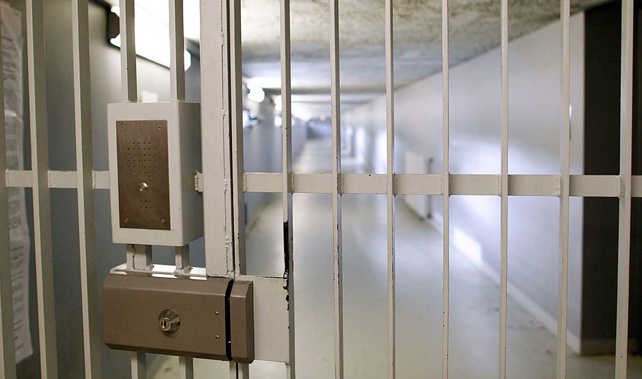
UPDATED 2.37PM A prisoner at risk of self-harm was tied down for 16 hours a day over 37 consecutive nights, an investigation by the Chief Ombudsman has found.
The investigation, released today, found five incidents where tie-down beds or waist restraints were used to manage severely at-risk inmates between July 2015 and June 2016. The restraints appeared to have been over-used because Corrections did not have the resources to manage the inmates, the report said.
Chief Ombudsman Peter Boshier concluded that the Corrections Department's treatment of the prisoners had breached the Convention against Torture and its own legislation. More generally, its management of at-risk prisoners around the country was found to be "substandard and detrimental to their well-being".
Tie-down beds and waist restraints can only be lawfully used in New Zealand jails as a last resort and in very prescribed circumstances. They cannot be used in ways that cause discomfort to prisoners or for disciplinary purposes.
Boshier's investigation found that in one case, an inmate at Auckland Prison was tied to his bed for 16 hours at a time, 37 nights in a row. In all, the prisoner spent 592 hours in restraints, and sometimes soiled his bed. His limbs were not moved during the prolonged periods of restraint - a breach of the Corrections Act and Corrections' policies.
In 36 of the 37 nights, Corrections staff failed to get medical approval for the restraints - also a breach of the department's rules.
Corrections told investigators that the man had been tied down to prevent self-harm, but the Ombudsman said he was successfully managed during the daytime without restraints and by being observed by staff. The use of tie-down beds coincided with periods of reduced staffing levels, Boshier said.
Boshier accepted the difficulty of managing high-needs prisoners, but said tying an inmate to a bed for up to 16 hours each day "as a way of managing resourcing pressures" was not appropriate.
Corrections chief executive Ray Smith said today he ordered an immediate review of Corrections policy on tie down beds when he was made aware of the case. He also ordered a review by Corrections' chief inspector.
Smith said the prisoner needed to be treated better.
"The fact that that plan had existed for so long, and had gone on for so long, I think allowed for mistakes to happen in the care and management of that person."
Smith said he accepted that some mistakes were made in the used of the tie-down bed and said "its use crept from being a last-option to a tool for managing the prisoner's health and complex behaviours".
Corrections had changed its policies and practices as a result of the case, he said.
The Ombudsman's report also identified "inappropriate behaviours" by two Corrections staff members which Smith described as "a failure of integrity" and not representative of "the patience and respect our staff take in such cases".
"I have personally met with the prisoner concerned and discussed his care over this time," Smith said.
"Although he remains a complex prisoner to manage, he is responding well to a new health management plan and is not presently self-harming."
Corrections Minister Louise Upston accepts the findings, but points out some of the inmates involved were very, very challenged, complex and unwell individuals.
"And we need to bear that in mind. They're very challenging circumstances to deal with."
Upston said there are lessons for Corrections in the report, and she's confident they've been taken on board.
"I am confident in future instances where they have a prisoner like this, who is in an extreme situation of trying to take their own life, that Correction staff will be able to manage them more appropriately."
In a separate case at Otago Corrections Facility, the Ombudsman found an inmate was continuously kept in a waist restraint with his hands tied behind his back, and the cuffs were only removed for two hours a day and four hours a night. He was locked in his cell for 21 hours a day.
This treatment went on for 12 weeks before the prisoner was released, during which time he was not given his medication and was not seen by a psychologist.
Boshier found that it usually took weeks for a prisoner to see a psychiatrist. It was not known how often prisoners were denied their medication.
CORRECTIONS' INCORRECT MOVES WITH AT-RISK PRISONERS
* Some being restrained by their legs, arms and chest over prolonged periods; and in waist restraints with their hands cuffed behind their backs
* Monitored by cameras including while using the toilet, with the monitors visible for anyone to see
* Some spending 24 hours a day alone, without social contact or even reading or writing materials
* An Otago Prison inmate kept in a waist restraint with his hands cuffed behind his back - only removed for two hours during the day, and every four hours at night
* He was also locked in his cell for 21 hours a day, wasn't seen by a psychologist and his medication stopped on entering prison. His mental health deteriorated and his self-harm escalated
* An Auckland Prison inmate secured to a tie-down bed for 16 hours at a time, for 37 nights in a row
* Tie-down beds being used as a threat to force compliance.
Where to get help:
• Lifeline: 0800 543 354 (available 24/7)
• Suicide Crisis Helpline: 0508 828 865 (0508 TAUTOKO) (available 24/7)
• Youthline: 0800 376 633
• Kidsline: 0800 543 754 (available 24/7)
• Whatsup: 0800 942 8787 (1pm to 11pm)
• Depression helpline: 0800 111 757 (available 24/7)
• Rainbow Youth: (09) 376 4155
• Samaritans 0800 726 666
• If it is an emergency and you feel like you or someone else is at risk, call 111.
Take your Radio, Podcasts and Music with you









